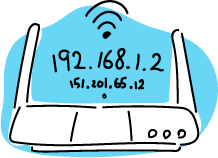What is an IP address?
IP addresses are a fascinating product of modern computer technology designed to allow one computer (or other digital device) to communicate with another over the Internet. IP addresses allow the locations of billions of digital devices connected to the Internet to be accurately determined and distinguished from other devices. It also means that someone needs your mailing address to send you mail, a remote computer needs your IP address to communicate with your computer.

“IP” stands for Internet Protocol, so an IP address is an Internet Protocol address. What does it mean? The Internet Protocol is a set of rules that govern Internet activity and facilitate the completion of various actions on the World Wide Web. Therefore, an Internet Protocol address is part of a systematically connected mesh that governs online communications by identifying both originating devices and various Internet destinations, thus making it possible to Shows two-way communication.
An IP address consists of four numbers, each containing one to three digits, with a period (.) separating each number or set of digits. Each of the four numbers can range from 0 to 255. Here's an example of what an IP address might look like: 46.165.37.208. This innocuous-looking group of four numbers is the key that empowers you and me to send and retrieve data across our Internet connections, ensuring that our messages, as well as our requests for data, data and data we request, will reach the correct Internet Destination. Without this digital protocol, sending and receiving data over the World Wide Web would be impossible.
IP addresses can be static or dynamic. Static IP addresses never change. They serve as a permanent Internet address and provide a simple and reliable way for remote computers to contact you. Static IP addresses reveal information such as the continent, country, region, and city where the computer is located; The ISP (Internet Service Provider) provides services to that particular computer; and technical information such as the exact latitude and longitude of the country, as well as the locality, of the computer. Many websites offer IP address lookup services to their visitors for free. If you're curious about your own IP address, you can locate these sites by doing a Google search.
Dynamic IP addresses are temporary and assigned each time a computer accesses the Internet. In fact, they are borrowed from a pool of IP addresses shared between different computers. Due to the limited number of static IP addresses, many ISPs reserve a portion of assigned addresses to share among their subscribers in this way. This reduces costs and allows them to serve far more subscribers than they otherwise would.
Static IP addresses are often preferred for uses such as VOIP (Voice over Internet Protocol), online gaming, or any other purpose where the user needs to be easily identified by other computers. taste and connect with them. Easy access can also be facilitated when using a dynamic IP address through the use of a dynamic DNS service, allowing other computers to find you even though you may be using a temporary IP address , once. This usually requires an additional fee, however, so check with your ISP.
Static IP addresses are considered less secure than dynamic IP addresses, as they are easier to track for data mining purposes. However, following safe Internet practices can help minimize this potential problem and keep your computer safe no matter what type of IP address you use.


